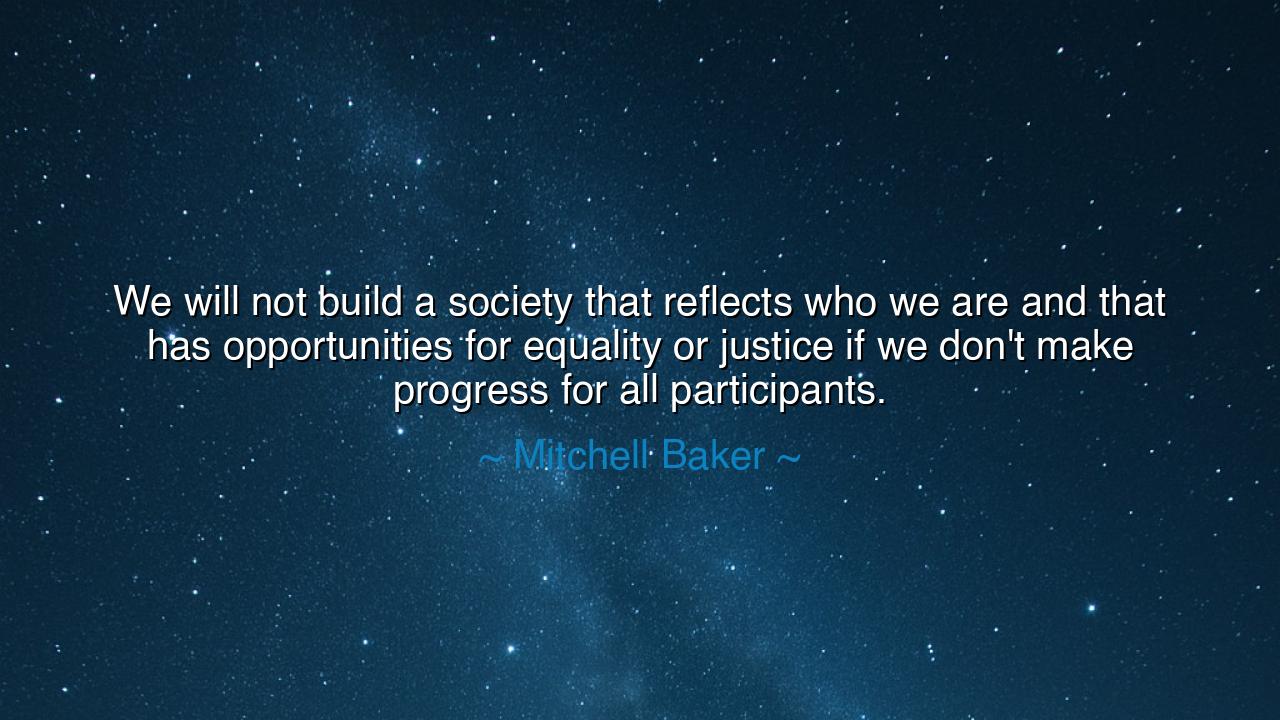
We will not build a society that reflects who we are and that has
We will not build a society that reflects who we are and that has opportunities for equality or justice if we don't make progress for all participants.






In the visionary and deeply principled words of Mitchell Baker, a leader of technology and humanity, there resounds a truth that bridges both moral and social realms: “We will not build a society that reflects who we are and that has opportunities for equality or justice if we don’t make progress for all participants.” These words, calm yet unyielding, speak to the essence of civilization itself—the understanding that no nation, no company, no community can call itself whole while part of its people are left behind. In Baker’s insight, progress is not a possession to be hoarded but a shared inheritance, one that must rise for all, or it will soon collapse for all.
The meaning of this quote flows from a profound recognition of interdependence. Every society, whether ancient or modern, stands as a web of human connection. When some within that web are denied opportunity or voice, the entire structure weakens. Baker reminds us that equality and justice cannot be added to society like ornaments; they must be woven into its design, into the very architecture of progress itself. Her words warn against the illusion of selective advancement—the false belief that some can prosper indefinitely while others remain unseen or unheard. In truth, the strength of progress is measured not by the triumphs of the few, but by the uplift of the many.
The origin of these words lies in Baker’s lifelong work as a leader in the open-source movement and as the head of Mozilla, where she fought to ensure that technology serves people rather than enslaves them. In a world increasingly divided by access to information, her vision was radical in its simplicity: that the digital age must belong to everyone, not just the powerful. Her statement is both a moral and a practical commandment—because if innovation excludes, it ceases to be progress at all. Baker’s life, devoted to transparency, collaboration, and community, gave her the clarity to see that justice is not an ornament of progress; it is its foundation.
History itself offers echoes of her truth. Consider the New Deal of Franklin D. Roosevelt, born from the ashes of the Great Depression. America could have chosen to rebuild only its banks and industries, leaving its working class to struggle. Instead, it sought to lift all people—through public works, social programs, and labor reforms. That progress, imperfect though it was, endured because it was shared. Or look to Nelson Mandela’s South Africa, where justice was rebuilt not on vengeance, but on reconciliation. Mandela understood, as Baker does, that a society divided between winners and losers of progress will forever remain at war with itself.
Baker’s words are also a warning to the modern world, where technology and wealth grow faster than compassion. She reminds us that progress without inclusivity becomes a new kind of tyranny—a gilded cage where innovation benefits only a narrow class, while others are trapped in silence. True progress must be measured not in profits or speed, but in dignity. A society that advances its machines while neglecting its people, she implies, builds not a future but a fortress. And such a fortress will inevitably crumble, for no wall is strong enough to contain the pain of inequality.
Yet her message is not one of despair—it is a call to unity and conscience. It tells us that every individual, every citizen, every creator has a role to play in ensuring that progress is shared. It begins with empathy in the workplace, with fairness in policy, with the courage to listen to voices long ignored. Whether in the halls of technology, the streets of governance, or the heart of daily life, we must strive for progress that mirrors the whole of humanity—not just its privileged reflection.
Therefore, O listener, take this lesson to heart: do not seek progress for yourself alone. Wherever you rise, bring others with you. Wherever you build, open the doors wide. Let your work and your choices reflect not only your ambition, but your compassion. A society that rises together stands unshaken; a people divided by progress will one day drown in their own success. Equality, justice, and shared growth—these are not luxuries, but the conditions of true civilization.
And so, remember the enduring wisdom of Mitchell Baker: that a society cannot reflect its true self until all who dwell within it can see their faces in its mirror. Progress that leaves anyone behind is but another form of injustice. But when we move forward together—each voice valued, each life honored—we do not merely build a society; we build a home worthy of the human spirit.






AAdministratorAdministrator
Welcome, honored guests. Please leave a comment, we will respond soon